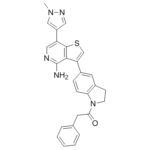GSK2593074A (also known as GSK’074) is a novel and potent necroptosis inhibitor with dual targeting ability to both RIP1 and RIP3. GSK2593074A showed structural similarities to the well-known RIP3 inhibitor GSK'843. GSK'074 inhibited necroptosis with an IC50 of less than 3 nM in a variety of cell types, including mouse SMCs, fibroblasts (L929), bone marrow derived macrophages (BMDM), and human colon epithelial cells (HT29). Additionally, GSK'074 but not Nec-1s prevented SMC cytokine production. The biological targets of GSK'074 were determined by biochemical analyses to be RIP1 and RIP3. GSK'074 demonstrated no detectable cytotoxicity even at 20 µM, in contrast to GSK'843, which induces profound apoptosis at high doses (>3 µM).
Physicochemical Properties
| Molecular Formula | C27H23N5OS |
| Molecular Weight | 465.569423913956 |
| Exact Mass | 465.162 |
| CAS # | 1337531-06-2 |
| Related CAS # | 1337531-06-2 |
| PubChem CID | 53466951 |
| Appearance | Light yellow to khaki solid |
| LogP | 4.1 |
| Hydrogen Bond Donor Count | 1 |
| Hydrogen Bond Acceptor Count | 5 |
| Rotatable Bond Count | 4 |
| Heavy Atom Count | 34 |
| Complexity | 732 |
| Defined Atom Stereocenter Count | 0 |
| InChi Key | LIGGMBSSOOVGAE-UHFFFAOYSA-N |
| InChi Code | InChI=1S/C27H23N5OS/c1-31-15-20(13-30-31)21-14-29-27(28)25-22(16-34-26(21)25)18-7-8-23-19(12-18)9-10-32(23)24(33)11-17-5-3-2-4-6-17/h2-8,12-16H,9-11H2,1H3,(H2,28,29) |
| Chemical Name | 1-[5-[4-amino-7-(1-methylpyrazol-4-yl)thieno[3,2-c]pyridin-3-yl]-2,3-dihydroindol-1-yl]-2-phenylethanone |
| Synonyms | GSK2593074A; GSK'074; GSK-2593074A; GSK 074; GSK 2593074A; GSK-074 |
| HS Tariff Code | 2934.99.9001 |
| Storage |
Powder-20°C 3 years 4°C 2 years In solvent -80°C 6 months -20°C 1 month |
| Shipping Condition | Room temperature (This product is stable at ambient temperature for a few days during ordinary shipping and time spent in Customs) |
Biological Activity
| Targets | RIP1; RIP3 |
| ln Vitro | GSK2593074A (GSK'074; 0.01, 0.1, 1, 10, and 100 nM; 6 hours for MOVAS cells; 3 hours for L929 cells) completely prevents necroptosis in both human and murine cells at an IC50 of ~3 nM. GSK2593074A inhibits necroptosis with an IC50 of ~3 nM in a variety of cell types, including mouse SMCs, fibroblasts (L929), bone marrow-derived macrophages (BMDM), and human colon epithelial cells (HT29)[1]. |
| ln Vivo | GSK2593074A (GSK’074; 0.93 mg/kg/day; i.p. injection; 14 or 28 days) is administrated to Apoe-/- mice immediately following pump implantation. GSK2593074A-treated mice exhibit significantly lessened aneurysm formation when compared to the DMSO group, as evidenced by a significantly smaller aortic dilatation (DMSO 85.39±15.76% vs GSK2593074A 36.28±5.76%; P<0.05) and a decreased incidence of abdominal aortic aneurysm (AAA) (from 83.3 to 16.7%). GSK2593074A significantly reduces the amount of aortic expansion (DMSO 66.06±9.17% vs GSK2593074A 27.36±8.25%; P<0.05)[1]. |
| References |
[1]. Identification of a novel class of RIP1/RIP3 dual inhibitors that impede cell death and inflammation in mouse abdominal aortic aneurysm models. Cell Death Dis. 2019 Mar 6;10(3):226. |
Solubility Data
| Solubility (In Vitro) | DMSO: 41.7 mg/mL (~89.5 mM) |
| Solubility (In Vivo) |
Solubility in Formulation 1: ≥ 2.08 mg/mL (4.47 mM) (saturation unknown) in 10% DMSO + 40% PEG300 +5% Tween-80 + 45% Saline (add these co-solvents sequentially from left to right, and one by one), clear solution. For example, if 1 mL of working solution is to be prepared, you can add 100 μL of 20.8 mg/mL clear DMSO stock solution to 400 μL PEG300 and mix evenly; then add 50 μL Tween-80 + to the above solution and mix evenly; then add 450 μL normal saline to adjust the volume to 1 mL. Preparation of saline: Dissolve 0.9 g of sodium chloride in 100 mL ddH₂ O to obtain a clear solution. (Please use freshly prepared in vivo formulations for optimal results.) |
| Preparing Stock Solutions | 1 mg | 5 mg | 10 mg | |
| 1 mM | 2.1479 mL | 10.7395 mL | 21.4790 mL | |
| 5 mM | 0.4296 mL | 2.1479 mL | 4.2958 mL | |
| 10 mM | 0.2148 mL | 1.0740 mL | 2.1479 mL |
